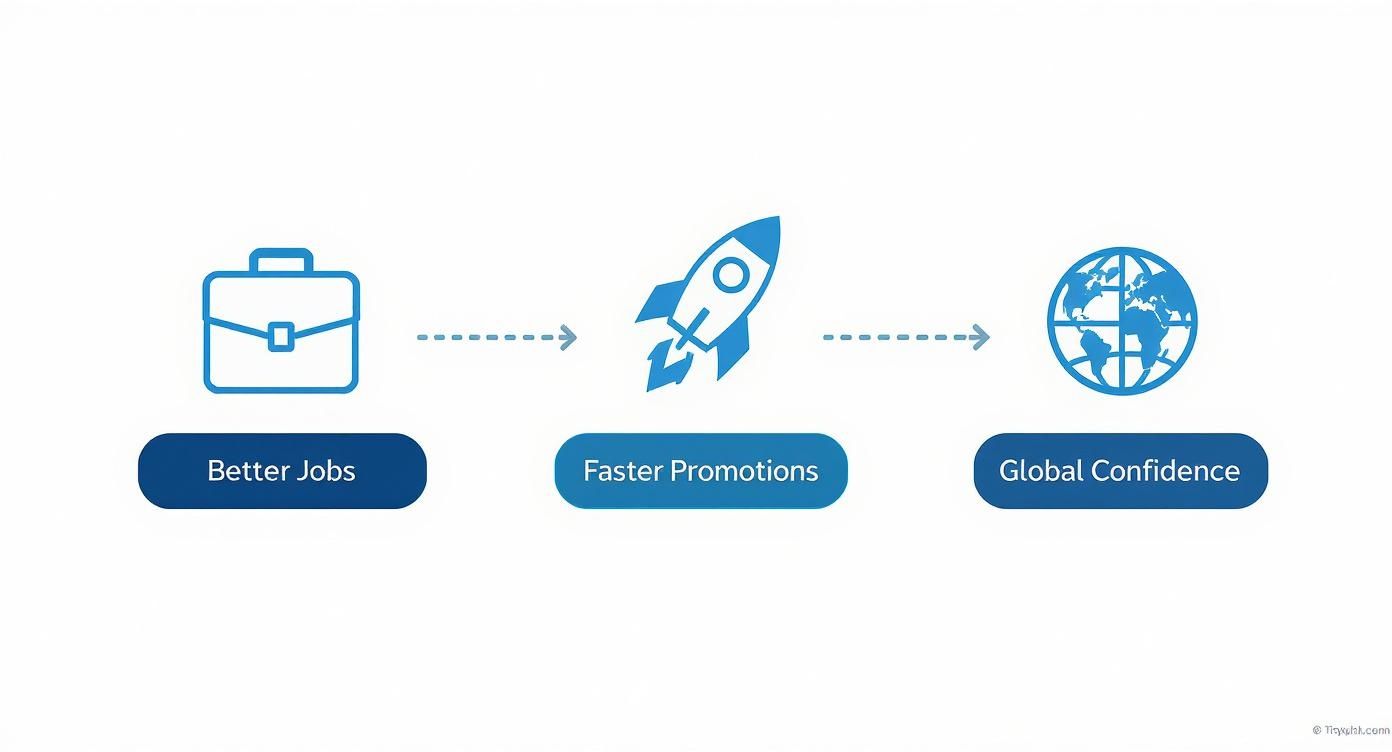Mastering the Business English Course in Singapore
So, what exactly is a business English course? Think of it as specialised language training that gets you ready for the corporate world. It's not just about learning to chat; it's about mastering the specific vocabulary, etiquette, and communication styles you need to succeed in a professional setting. This means moving past general conversation and drilling down into practical skills like negotiating contracts, delivering powerful presentations, and crafting the perfect professional email.
What a Business English Course Truly Offers
It’s easy to think that if you're fluent in everyday English, you’re all set for the workplace. But the truth is, the corporate world has its own unique dialect. It's a language filled with specific jargon, formal structures, and subtle cultural cues that can make or break a deal. A business English course is your bridge over that gap, giving you the precise communication tools needed to not just survive, but thrive.
Here's a simple way to look at it: general English helps you describe a car. Business English teaches you how to negotiate its sale price, pitch its best features to a room full of investors, and write a marketing campaign that sells it. The entire focus shifts from casual chat to communication that gets results.
Moving Beyond Basic Vocabulary
Many people mistakenly believe these courses are just about memorising a long list of buzzwords. While you'll certainly pick up relevant industry terms, the real value is in learning how and when to use them. A good course is built around the real-world scenarios you’ll face every single day at the office.
You can expect to dive deep into areas like:
- Professional Writing: This is all about mastering clear, concise, and persuasive emails, reports, and proposals that people actually want to read.
- Meeting and Negotiation Language: You'll learn the phrases needed to tactfully interject, present a counter-offer, or build agreement in a high-stakes discussion.
- Presentation Skills: This goes beyond PowerPoint. It's about structuring a compelling story, guiding your audience with the right language, and handling tough questions with confidence.
- Cross-Cultural Communication: Learn to navigate different communication styles, helping you build stronger, more effective relationships with international clients and colleagues.
This kind of focused training isn't just about sounding more "professional." It's about becoming a more effective, confident, and credible communicator in any business situation. You gain the power to explain complex ideas with total clarity.
At the end of the day, signing up for a business English course is a direct investment in your career. It shows you’re serious about excellence and gives you the linguistic edge needed to lead, influence, and stand out in Singapore’s competitive global business scene.
Why Business English Is Your Career Superpower
Thinking of business English as just another language skill is like seeing a high-performance race car as just another way to get groceries. It completely misses the point. Getting a real handle on professional communication isn’t about making small tweaks; it’s about giving yourself a career superpower that unlocks real, measurable advantages in Singapore's competitive job market.
This isn't some abstract idea. It's the difference between stumbling over your words during a client pitch and leading the conversation with absolute confidence. It’s about having the ability to negotiate a contract with partners from overseas, not just with basic fluency, but with the specific, persuasive language that lands you better terms. Signing up for a quality business English course is a direct investment in your own professional growth.
Unlock Tangible Career Advantages
The benefits of mastering professional English go way beyond just sounding a bit more polished in meetings. It directly translates into career momentum, opening doors that might otherwise have stayed shut.
Here’s what that looks like in the real world:
- Better Job Opportunities: As a global hub, companies in Singapore are actively looking for people who can communicate flawlessly with international clients and colleagues. A business English certification makes your CV pop.
- Faster Promotions: Let's face it, strong communicators make natural leaders. If you can clearly explain a strategy, motivate your team, and present results effectively, you're marking yourself out for management.
- Unwavering Global Confidence: Picture yourself walking into any multinational office, whether it’s in Frankfurt or San Francisco, and feeling completely at home. That kind of confidence is a game-changer.
Thriving in a Globalised Economy
This skill is especially vital here in Singapore, a nerve centre for international trade and finance. The demand for professionals with top-notch English communication isn't just a local trend—it’s a global economic reality. The need for crystal-clear communication across borders is driving huge market growth.
The global market for business English language training is expected to grow by about USD 5.4 billion between 2025 and 2029. This boom is powered by sectors like finance and technology, where precise communication is absolutely critical for international projects to succeed.
This explosive growth shows just how much value companies are placing on these skills. Singapore’s position as a major business hub means our local market is a key part of this trend, with multinational corporations constantly on the hunt for talent who are fluent in the language of business. You can dive deeper into the business English market trends on Technavio to see the full picture.
At the end of the day, a business English course is more than just an educational programme; it's a strategic career investment. It gives you the linguistic tools and cultural know-how you need to not just take part in the global economy, but to become a leader within it.
Core Skills You Will Master
A top-notch business English course is so much more than just memorising lists of words. It’s about building a practical toolkit of communication skills you can put to use the very next day at work. Think of it less like a traditional classroom and more like a flight simulator for your career—a safe space to practise navigating real-world business scenarios. The ultimate aim is to arm you with the precise language needed to handle any professional situation with confidence and clarity.
You won't just be learning grammar rules; you'll master how to apply them when the pressure is on. This hands-on approach ensures that every skill you pick up has a direct, tangible impact on your job performance, helping you get your point across more effectively and build stronger professional relationships.
Mastering Professional Presentations
Public speaking can be nerve-wracking for anyone, let alone in a second language. A business English course helps take the fear out of it by breaking the process down into simple, manageable steps. You’ll learn to do more than just read from your slides; you'll learn how to weave a compelling story that keeps your audience engaged from the first slide to the last.
This means getting comfortable with techniques like:
- Structuring Your Content: You’ll discover how to create a logical flow with a strong opening, a well-supported body, and a conclusion that sticks.
- Using Signposting Language: You’ll practise using phrases like, "Turning now to our quarterly figures…" or "To summarise the key takeaways…" These act like verbal road signs, guiding your audience through complex information without getting lost.
- Managing Q&A Sessions: You'll build the confidence to field tough questions with professional grace, using specific phrases to clarify, reframe a point, or politely park a question for later.
Excelling in Negotiations and Meetings
Negotiations are where deals are made or broken, and the language you choose is your most powerful asset. A specialised course gets right into the specific phrasing you need to protect your interests while still working towards a common goal. You'll learn the subtle art of proposing terms, expressing disagreement without causing offence, and finding that middle ground for a win-win result.
In the same way, you’ll learn how to be an active, effective participant in meetings. This includes knowing when and how to interrupt tactfully, put your ideas forward clearly, and build on what others have said. If you're looking to boost your overall speaking skills, check out our guide on how to speak English fluently.
The skills you develop in a business English course are designed to give you a strategic advantage. It's not just about what you say, but how you say it—ensuring your message is always clear, persuasive, and professional.
This infographic shows exactly how these skills translate into major career wins, like landing better jobs, securing faster promotions, and operating with confidence on a global stage.
The image lays out a clear path from learning these skills to reaping real, professional rewards, underscoring the value of the investment in your career.
General English vs Business English A Skill Comparison
To really see the difference, it helps to compare what you learn in a standard English class with what a specialised business course offers. The focus shifts from everyday communication to targeted, professional application.
This table breaks down the key differences.
| Skill Area | General English Focus | Business English Focus |
|---|---|---|
| Writing | Composing personal emails, stories, and essays. | Crafting persuasive reports, professional emails, and proposals. |
| Speaking | General conversation, storytelling, and social interactions. | Leading meetings, delivering presentations, and negotiating terms. |
| Vocabulary | Everyday words for travel, hobbies, and daily life. | Industry-specific jargon, corporate idioms, and formal terminology. |
As you can see, while general English builds the foundation, business English builds the skyscraper. It equips you with the specialised tools needed to not just survive, but thrive in a professional environment.
How to Choose the Right Course for You
Picking the right business English course isn't just about finding a class—it's a strategic career move. With so many options available in Singapore, it’s easy to get lost. You need to look past the shiny brochures and focus on what will actually help you grow professionally.
Think of it like picking a business partner. You need a perfect match for your specific goals, your learning style, and your already busy schedule. This choice goes way beyond just finding a class that fits your budget; it’s about investing your time and money where you'll see a real return. The right course will feel less like a stuffy classroom lesson and more like a professional development workshop designed just for you.
Look at the Instructor’s Real-World Experience
The most critical factor in any language course is, without a doubt, the instructor. A great teacher doesn’t just drone on about grammar rules. They make the language come alive by connecting it to real-world business situations.
Ideally, you want an instructor who is not only a native English speaker but also has a solid corporate background. Someone who has actually worked in finance, marketing, or management will understand the subtle, unwritten rules of workplace communication. They bring practical insights to the table that a purely academic teacher simply can't. Never be shy about asking about a teacher's professional history before you sign up.
Check if the Curriculum and Format Fit You
The course content should align directly with what you do every day at work. A generic, one-size-fits-all course won't cut it. You need a programme that hones practical skills like negotiating a contract, delivering a persuasive presentation, or crafting a professional email.
A top-tier business English course is built around industry-specific case studies and role-playing exercises that mimic real challenges.
You also have to be realistic about which learning format suits your life. Here’s a quick rundown:
- In-Person Classes: These are brilliant for direct interaction and offer fantastic networking opportunities with other ambitious professionals right here in Singapore.
- Online Courses: These give you ultimate flexibility, which is perfect if you’re juggling a demanding job and need to learn on your own time.
As you look into different options, it’s a good idea to check out the best online course platforms to see where many of the best courses are hosted.
Do Your Homework Before Committing
Before you pull out your credit card, take a few simple steps to make sure a course is the right one. Many of the best schools will let you sit in on a trial class. This is an incredible opportunity to get a feel for the teaching style and see the classroom dynamic for yourself. For more tips on selection, you can also check out our detailed guide on choosing a language school in Singapore.
Another smart move is to connect with past students on professional networking sites. They can give you the real story—honest, unfiltered feedback on what the course is actually like and whether it delivered on its promises.
In Singapore, the demand for specialised business English skills is soaring. Professionals are increasingly looking for small-group courses that use interactive role-play to simulate actual business scenarios, ensuring they get personalised attention and practical, hands-on experience.
As Singapore continues to cement its position as a global business hub, investing in the right training is more important than ever. Course fees can range from SGD 3,040 for a 40-hour package to over SGD 11,040 for more intensive programmes, which just goes to show how highly these skills are valued. By carefully weighing your options, you can find a course that gives you both the skills and the confidence to truly excel.
The Rise of Online Business English Learning
The way professionals in Singapore sharpen their skills is changing, and language learning is right at the heart of this movement. Remember the old days? Rushing to a physical classroom after a long day at the office was the only way to improve your professional communication. That's no longer the case. Today, the business English course has found its home online, offering a much more practical and powerful alternative for busy people.
This digital shift is all about one thing: flexibility. Modern professionals need learning to fit their lives, not the other way around. Online platforms deliver just that, letting you squeeze in lessons during a lunch break, on your commute, or even late at night. For anyone juggling a demanding career, this adaptability is a total game-changer.
On top of that, online learning erases geographical lines. It connects you to a global pool of expert instructors, many with direct corporate experience from different industries. This means you can learn from the very best, no matter where you are, a huge plus for those seeking quality online tutoring opportunities.
Technology Is Speeding Up Your Progress
Don't mistake modern online courses for simple video recordings. The best platforms today are packed with smart tools that create a truly personal and engaging learning experience. This is where technology really makes a difference, turning learning into a much more efficient process.
Here are a few key advantages:
- AI-Powered Feedback: Imagine getting instant, precise corrections on your pronunciation, grammar, and even the tone of your writing. This allows you to fine-tune your skills on the spot.
- Interactive Simulations: You can jump into realistic role-playing exercises, like a virtual negotiation or a client presentation, to practise your skills in a safe, controlled setting.
- Personalised Learning Paths: Smart systems can track your progress, spot your weak points, and tailor the curriculum to focus on what you need most, helping you improve faster.
As professional development continues to change, seeing how AI is revolutionizing education gives us a peek into the future of language training. These tech-driven features are making online learning an incredibly effective way to master business English.
Corporate Singapore Is All-In on Digital Learning
This trend isn’t just for individuals. Companies all over Singapore are embracing online solutions for their corporate training needs. The ability to scale up training and do it efficiently makes digital platforms a perfect fit for getting entire teams up to speed.
Singapore's online education market was valued at around USD 400 million in 2023 and is projected to hit USD 1.1 billion by 2028. Corporate training is the fastest-growing part of this, showing a huge push from businesses towards flexible and targeted business English solutions.
This incredible growth shows just how much trust companies are putting into digital learning. In fact, around 70% of Singaporean companies have already woven online platforms into their training programmes. It’s clear proof that they work. At the end of the day, the rise of online learning means that a top-notch business English course is more accessible and has a bigger impact than ever before.
Still Have Questions About Business English Courses?
Deciding to invest in your professional development is a big step, and it's natural to have a few questions before you commit. If you're considering a business English course, you want to be absolutely sure it's the right move for your career. Let's tackle some of the most common queries we hear from professionals just like you.
Our goal is to give you the clarity you need to move forward with confidence. From the language level you need to start with to the actual value you'll get, these answers will help you make a smart decision about your growth.
What English Level Do I Need to Join?
Most solid business English courses are not for complete beginners. You'll generally need at least an intermediate (B1) level of English to really benefit from the material. Think of it as a prerequisite—you should already have a good handle on the basics of grammar and vocabulary.
The course is designed to build on that foundation, not create it from the ground up. You already know the alphabet; this course teaches you how to draft a persuasive proposal with it. Many schools in Singapore will have you do a quick placement test to make sure you're in a class with others at a similar level, which makes the whole learning process much more effective for everyone.
How Long Does a Course Usually Take?
The timeline for a business English course really varies. It all depends on the intensity and structure of the programme. You could find a quick, focused course that runs for 40 hours over a few weeks, or a more in-depth programme that takes over 160 hours to complete.
For working professionals, many courses are scheduled during evenings or on weekends to fit around a 9-to-5. Online courses offer even more flexibility, letting you set your own pace. The key, no matter which option you choose, is consistency. Showing up and engaging regularly is what truly moves the needle.
A business English certificate does more than just show you can speak the language. It sends a powerful message to employers that you've mastered the specific communication skills—from negotiation to professional emails—that really drive success in the corporate world.
Are These Courses Actually Worth the Money?
In a word, yes. The return on investment isn't just a vague promise; it shows up in real career growth, a huge boost in confidence, and a wider range of professional opportunities. When your communication skills are sharp, it often leads to better performance reviews, especially if your job involves talking to clients or working with international teams.
You're investing in your personal brand. The ability to articulate your ideas clearly and persuasively in the global language of business can open doors to promotions, leadership positions, and better-paying jobs that might have felt out of reach before. The initial cost is often quickly offset by the career gains you'll make.
What's the Difference Between the Certificates?
It's really important to know the difference between a general English certificate and one for business English. A general qualification like the IELTS or TOEFL is mostly for university applications or immigration—it just proves you have a general command of the language.
A certificate from a business English course, on the other hand, is specifically for the corporate environment. It tells a potential employer that you're not just fluent, but you're fluent in the right way for a professional setting. That specialisation makes you a much more compelling candidate for roles where communication is key.
At Spanish Council Singapore, we've seen firsthand how specialised language skills can transform a career. While our expertise is in Spanish, we champion the incredible benefits that any targeted language training provides. Ready to see how learning a new language can open up your world? Visit us at https://spanish.sg and check out our courses designed for professionals.















